10 月 . 13, 2024 15:51 Back to list
Flanged Ball Valve Variations for Enhanced Fluid Control Solutions
Understanding Ball Valve Flange Types
Ball valves are crucial components in various piping systems, ensuring efficient control of fluid flow. Among the different designs and configurations available, the flange type is widely used for its benefits in installation, maintenance, and operation. This article delves into the characteristics, advantages, and applications of ball valve flange types.
What is a Ball Valve?
A ball valve is a type of quarter-turn valve that uses a spherical disc to control the flow of fluid. The ball has a hole through its center, and when the valve is open, the hole is aligned with the flow, allowing fluid to pass through. When the ball is rotated 90 degrees, the hole is perpendicular to the flow path, effectively shutting off the flow. This simple yet effective mechanism makes ball valves ideal for various applications including water supply, oil and gas, and chemical processes.
Flange Type Ball Valves
Flange type ball valves are designed to be mounted onto piping systems using flanges. Flanges are protruding rims, edges, or protrusions that facilitate the connection of pipes, valves, pumps, and other equipment in a piping system. The flange on a ball valve provides a stable and secure connection, minimizing the risk of leaks and allowing for easy alignment with existing pipework.
Flange connections can be made through different methods, including bolts or welding. Flange type ball valves typically conform to standard flange dimensions, such as ANSI, DIN, or JIS, making them compatible with a wide range of piping materials and systems.
Advantages of Flange Type Ball Valves
1. Ease of Installation Flange type ball valves can be easily installed within existing systems. They can be bolted directly to the piping flanges, allowing for quick and straightforward setup without the need for complex tools.
ball valve flange type

2. Robustness The design of flange type valves contributes to their structural integrity. The wide surface area of the flanges distributes stress evenly, reducing the likelihood of damage under high pressure or temperature conditions.
3. Leak Prevention The bolted connection helps ensure a tight seal between the valve and the piping, minimizing the potential for leaks. This is particularly important in high-stakes industries where even a minor leak can lead to significant safety and financial issues.
4. Maintenance Maintenance is simplified with flange type ball valves. If a valve needs to be serviced or replaced, it can be easily detached from the pipeline without completely disassembling the system. This reduces downtime and lowers maintenance costs.
5. Wide Application Range Due to their durability and reliability, flange type ball valves are widely used across various industries, including oil and gas, water treatment, pharmaceuticals, and manufacturing.
Applications of Flange Type Ball Valves
Flange type ball valves have a broad range of applications, making them versatile components in many sectors. In the oil and gas industry, they are often used to control the flow of crude oil, natural gas, and other liquids under high pressure. Water treatment facilities rely on these valves for efficient flow regulation in various processes, including filtration and chemical dosing.
In industrial manufacturing, flange type ball valves are employed to manage fluid flow in hydraulic systems, cooling systems, and chemical transport. They ensure precise control, which is critical in maintaining system efficiency and safety. Flange type ball valves are also prevalent in building services, such as heating and cooling systems, where they regulate the flow of water and steam.
Conclusion
Flange type ball valves play an indispensable role in modern piping systems, offering numerous benefits such as ease of installation, structural integrity, leak prevention, and versatility. Their robustness and reliability make them suitable for a wide array of applications across various industries. As industries continue to evolve, the efficiency and effectiveness of flange type ball valves will remain a cornerstone of fluid management, supporting both operational needs and safety standards. Whether you are in the process of designing a new system or upgrading an existing one, considering the incorporation of flange type ball valves will greatly enhance your fluid control solutions.
Share
-
Understanding the Differences Between Wafer Type Butterfly Valve and Lugged Butterfly ValveNewsOct.25,2024
-
The Efficiency of Wafer Type Butterfly Valve and Lugged Butterfly ValveNewsOct.25,2024
-
The Ultimate Guide to Industrial Swing Check Valve: Performance, Installation, and MaintenanceNewsOct.25,2024
-
Superior Performance with Industrial Swing Check Valve: The Essential Valve for Any SystemNewsOct.25,2024
-
Industrial Swing Check Valve: The Ideal Solution for Flow ControlNewsOct.25,2024
-
You Need to Know About Industrial Swing Check Valve: Functionality, Scope, and PerformanceNewsOct.25,2024